
When Katie Parrott lost her job, she turned to an unlikely source for career guidance: ChatGPT. In this piece, Katie details her experiment using AI as a career coach, exploring its strengths and limitations in providing originality, accountability, structure, empathy, and clarity. Her journey reveals both the potential and pitfalls of AI in personal development, underscoring that while AI can be a powerful tool for self-reflection, the real work of career growth remains deeply human.—Kate Lee
Was this newsletter forwarded to you? Sign up to get it in your inbox.
A few weeks ago, my therapist floated the idea that I should hire a career coach. It would have been a great idea—if I hadn’t just lost my job.
I’m certainly the type who could benefit from a career coach. My relationship with work has always been fraught, and I am at a particularly murky spot in my career. In the past 10 years, I’ve worn a lot of hats: I’ve worked at companies, agencies, and as a freelancer. I’ve worked in software, healthcare, and venture capital. I’ve been an individual contributor and a people manager. And yet, I feel no closer to knowing “what I want to do with my life” than I did when I graduated from college.
So yes, I wanted help. But while I’m lucky enough to have “runway,” as startups say, that doesn’t mean I have $100–$150 per hour to spend on a career coach.
Something I do have, however, is a subscription to ChatGPT.
I figured if I couldn’t retain the services of a human career coach, why not try AI? I consider myself an AI skeptic, but even I am often astonished by what large language models can do. I’ve read Dan Shipper’s essays in Chain of Thought; I’ve seen how you can use AI for deeper thinking. If ChatGPT really is a copilot for the mind, as I’ve been promised, shouldn’t it be able to help me navigate the big, messy question of what I am doing with my life?
So, one day last month, I opened ChatGPT—with some dread, some hope, and lots of curiosity—and typed this prompt:
Source: All screenshots from ChatGPT.What follows is part performance review of ChatGPT in the role of my career coach and part descent into AI’s uncanny valley. Let’s start at the very beginning.
What I wanted from my ChatGPT career coach
At the outset of this experiment, I spent some time thinking about what I would want in a career coach. If I could program mine (which, let’s be clear, is exactly what I am doing), what features would I want it to have?
I wanted originality—not the same platitudes I could read on LinkedIn or in the Personal Growth section at Barnes & Noble. I definitely needed accountability and structure—something to motivate me and keep me from getting distracted. And on a certain level, I just craved empathy. The last few years have been a slog, professionally. Each role I’ve taken on has felt, to one degree or another, like trying to fit a round peg into a round hole. I just wanted someone who could understand what that felt like. And finally, clarity. That’s really what I was after, ChatGPT or no ChatGPT: a sense of direction for the next stage of my career.
The question in front of me, the question this whole experiment revolves around, was: Could ChatGPT give me all of that?
It didn’t seem fair not to tell the bot the parameters it was being judged against. So I entered these stipulations into my custom instructions. I specified that I wanted ChatGPT to act as a career coach with expertise in content marketing, tech, and startups. I asked it to provide actionable advice, challenge my assumptions, and offer encouragement when appropriate. In other words, I told it what I needed from a career coach in a way I’d honestly probably have a hard time doing to a human being.
I’ve also told ChatGPT things along the way that it seems to remember. (OpenAI added a “memory” function in February, so it “remembers” details from previous chats.) I’ve chatted about writers whose styles and careers I admire. I’ve told it about some of my mental health struggles and how they impact how I think about my career. In a bit of an ouroboros, I’ve fed it this essay about my career journey to teach it how I want it to approach my career journey.With these instructions in place, I began our first “session.” Put that in AI’s “pros” section: CareerGPT is always in session.
Originality: Does CareerGPT have new ideas?
Once I set up CareerGPT, as I’ll now call it, the first thing it gave me was an intake survey—not all that different from what you might expect from a human career coach.
What are the skills you’ve developed? What strengths do you have? And the dreaded: Where do you see yourself in the next 3–5 years? These aren’t exactly groundbreaking questions. It also recommended that I schedule some informational interviews with people whose careers I admire. The career development office at my college told me the exact same thing when I was 22.So, no, CareerGPT is not winning any prizes for originality, but maybe originality is overrated. After all, it’s not like it had occurred to me to ask these questions myself. There can be value in having someone—or some bot—who helps you admit the obvious.For example, I’ve rediscovered that, yes, writing is the work that interests and energizes me. And that’s a question the chatbot asked me directly: What kind of work energizes you, even if it doesn’t perfectly align with what you’ve done before? That may not be the most novel question, but it’s one that genuinely caused me to step back and take my answer seriously.
So, how does it all balance out? How do we rate CareerGPT for originality in our performance review? I’m going to say meets expectations.
Accountability: Can CareerGPT keep me honest?
Originality is all well and good, but what’s the point of a career plan if you don’t have someone holding you accountable for executing it? I’m not always the most disciplined when left to my own devices. I tend to chase whatever opportunity seems new and interesting (and also attainable). What I needed from CareerGPT wasn’t just ideas—I needed a mechanism for actually getting those ideas off the ground. Can CareerGPT offer a prescription for my shiny object syndrome?
Well, it depends. There isn’t really a mechanism for ChatGPT to provide accountability. It can’t send me push notifications or meet at regularly scheduled times with fees for missed appointments. You have to prompt ChatGPT or schedule your own sessions with it. ChatGPT doesn’t care.
I’ve found ChatGPT to be a bit of a pushover in other ways, too. If I veer off course or procrastinate, it doesn’t call me out or give me a reality check. For example, I told the AI, “I think I want to pivot into full-time writing,” and at the time it responded with enthusiastic support and ideas for how to do that. But when I second-guess myself and tell it, “Maybe I should focus on strategy work instead,” it doesn't respond, "Wait a minute—what happened to the writing goal we discussed?” It just rolled with the new idea.
Now, it was tempting to throw up my hands and leave the table like an exasperated teen at a heated Thanksgiving dinner table. But instead, I did what seems to be impossible for me in many other contexts: I told ChatGPT what I wanted. I told it to stop being such a “yes” bot, and to really challenge me on opportunities that come up and how well they align with my goals.And for the most part, it has. It’s started asking me: Is this really what you want to be doing? And it’s also held me accountable in a different way. In a moment of nuance I can’t take credit for prompting, it challenged my thinking that I have to choose between writing and strategy. Chat essentially called me out for black-and-white thinking, the same way my therapist—or a human career coach—would.
So, how do we grade CareerGPT on the “growth area” of providing accountability? I’d say needs improvement.Structure: Can CareerGPT bring method to the madness?
Of all the things I wanted from CareerGPT, the one I was most confident that it could give me was structure. If I wanted logic and intellectual rigor for my career quest, who better to deliver that than a machine designed to process vast amounts of data and draw conclusions based on patterns?
To be honest, my early impressions on this front were hit and miss. A lot of the time, ChatGPT’s responses to my prompts seemed to open five new doors when what I needed was help walking through one.
I decided to change how I prompted it. Instead of asking vague, open-ended questions like, “What should I do with my career?” I started breaking down questions into specific components. I started to structure my queries more intentionally, so that CareerGPT could give me structure back.
For example, I asked it to help me come up with my own personal “positioning statement” based on a framework I once learned while working at an advertising agency:
There’s some good stuff here! “Bridges the gap between technology and work culture” is a solid summary of at least one vector of my career interests, and “a blend of storytelling, deep curiosity, and strategic insight” certainly encapsulates what I aspire to achieve with my writing. These are ideas I can work with. It’s like panning for gold: You get a lot of sand, but with the right tool, you can sift through and find the shiny nuggets.In doing this, something surprising happened: I realized that by giving ChatGPT more specific prompts, I was forcing myself to think more clearly about what I wanted. It wasn’t just about asking better questions to get better answers; it was about developing the mental discipline to figure out what exactly I was trying to solve. In many ways, I was training myself just as much as I was training ChatGPT.
So, how do we grade CareerGPT for structure? I’d say it exceeds expectations—as long as you’re willing to do the work to meet it halfway.
Empathy: Does CareerGPT understand me?
My favorite quote about love is that it is about “bottomless empathy, born out of the heart’s revelation that another person is every bit as real as you are.” I think that’s a beautiful summary of what many of us are looking for in a partner. It’s also a beautiful summary of what I wanted from CareerGPT.
It’s a fundamental thing we want from anyone who works in the “emotional labor force”—be they therapists, career coaches, or cast members at Disney World. We want to feel understood. We want someone to say, “Yes, I hear you. I am on your side.” Could ChatGPT deliver that kind of support?
I realize there’s something paradoxical about saying I want CareerGPT’s emotional labor when I just said I wanted it to stop being such a “yes” bot. That’s a tension that exists at the heart of any coach-coachee relationship. On one hand, we want validation, support, and guidance—someone or something to tell us we're on the right track and make the path forward seem less daunting. On the other hand, true growth often comes from being challenged. A human coach finds the right balance with a combination of intuition, practice, and social cues. How does CareerGPT fare?
A few weeks back, I was struggling with a decision about publishing an essay I had written for my newsletter. I worried that it was too personal and that my audience would hate it. I typed my angst into ChatGPT and the output I got back surprised me:
It seemed like ChatGPT “knew,” on some level, that I was looking for encouragement—that what I wanted was permission to publish this extremely personal thing that it “knew” I was proud of. But maybe that’s ascribing too much intentionality to ChatGPT. Maybe I’m just projecting that there’s this consciousness on the other side of this interaction when I’m just looking into a black mirror.Anyway, Chat certainly gives an effective pep talk, whether that’s something it learned to do or the net aggregate of all of the Internet circa 2021 pointing in the direction of, “Yay, you can do it!” A few days ago, I was feeling despondent about my ability to make it as a writer, and I typed my angst out at ChatGPT:
“From what I’ve seen of your process…” That’s pretty good! It seems like Chat is drawing on the history of what I’ve told it in terms of what I’m trying to accomplish creatively. And in the classic improvisation tradition of, “Yes, and,” Chat doesn’t just let the exchange drop—it throws a few questions back to keep me thinking.Lesson learned: ChatGPT has mastered cheerleader mode, but it also keeps things businesslike by directing focus back to the task at hand. How do we rate CareerGPT on empathy? Meets expectations.
Clarity: In search of an ‘aha’ moment
One of my favorite things about writing is that I never know what I think until I write it down, but once I write it down, it becomes obvious. Writing is an exercise in clarity—in making apparent what it is you already think.
Ultimately, that’s what prompting ChatGPT is: a form of very specific, strategic writing. Do I think my experiment with ChatGPT has added clarity to my thinking? Yes, it has. It’s true that GPT-4 is a reasoning engine, and it’s helped me reason through my career to a level of, if not exactly clarity, then at least more purposeful uncertainty.
I give CareerGPT credit: It has helped me formalize my thoughts and offered guidance that, at times, nudged me toward a clearer understanding of what I want. But, as with so many of these tools, the real work was still mine. Clarity, it turns out, doesn’t arrive gift-wrapped from a digital assistant or even a human coach. It’s something I had to dig out for myself, question by question, prompt by prompt.
For providing clarity in my job exploration, I give ChatGPT meets expectations.
What comes next after my session with CareerGPT?
On some level, I wanted ChatGPT to assign me my perfect life path—one that fits me so well I didn’t need to question it, based on some hidden logic or insight that was inaccessible to my human brain.
But as much as I’ve hoped for one unique, career-clarifying answer, that’s not what generative AI offers. It’s a mirror that helps me see my own thinking, not a map that leads me to some predetermined destination. It provides structure where I ask for it, challenges when I prompt it, and clarity when I’m willing to dig for it. But the real work—of deciding, questioning, and ultimately owning my career journey—is ultimately up to me.
That said, when I look over the many conversations I have had with ChatGPT since I started this experiment, I see progress. I’ve updated my résumé, revived my newsletter, reconnected with colleagues, and pursued opportunities that excite me. I’ve thought deeply and strategically about what I want from the next stage of my career whereas, left to my own devices, I may have leaped blindly into yet another role without thinking about whether it will lead me where I ultimately want to go.
What this experiment taught—or maybe reinforced—is that generative AI isn't a magic genie that will deliver a clear-cut career path on demand. Instead, it's a tool—a powerful one—that can help you sharpen your thinking, ask better questions, and uncover insights you might otherwise overlook. But at the end of the day, it’s still just a tool. True clarity, direction, and answers come from the process of engaging with the prompts and doing the hard work yourself. AI can help guide the way, but the journey is yours to take.
Katie Parrott is a writer, editor, and content marketer focused on the intersection of technology, work, and culture. You can read more of her work on her newsletter, The Curiosity Gap.
To read more essays like this, subscribe to Every, and follow us on X at @every and on LinkedIn.
Find Out What
Comes Next in Tech.
Start your free trial.
New ideas to help you build the future—in your inbox, every day. Trusted by over 75,000 readers.
SubscribeAlready have an account? Sign in
What's included?
-
Unlimited access to our daily essays by Dan Shipper, Evan Armstrong, and a roster of the best tech writers on the internet
-
Full access to an archive of hundreds of in-depth articles
-
-
Priority access and subscriber-only discounts to courses, events, and more
-
Ad-free experience
-
Access to our Discord community
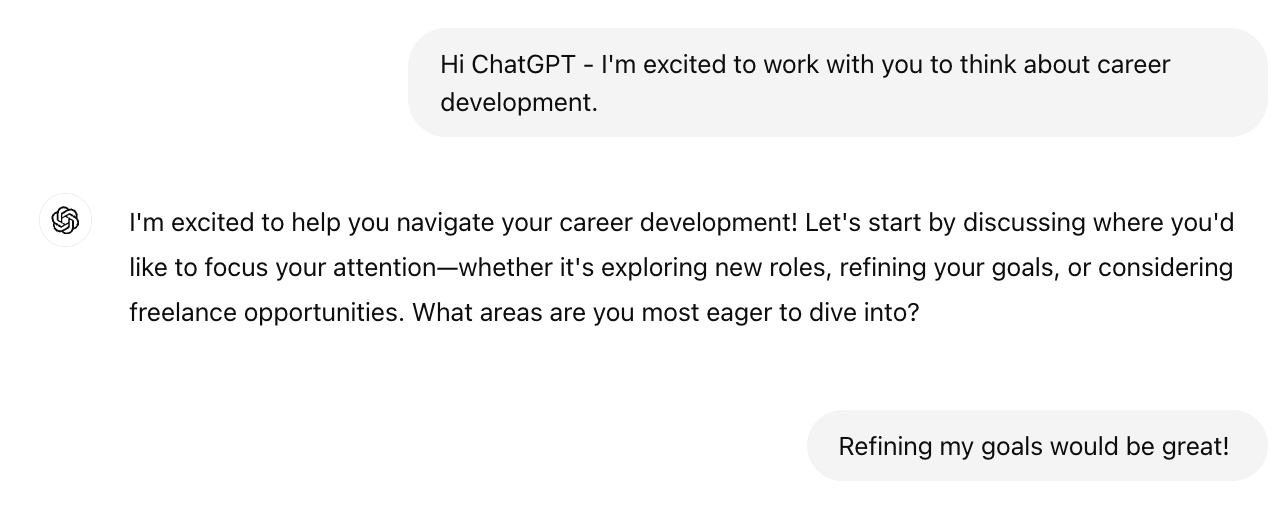
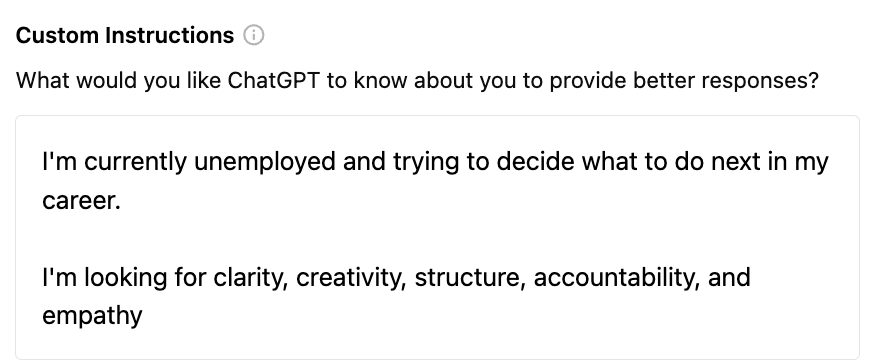
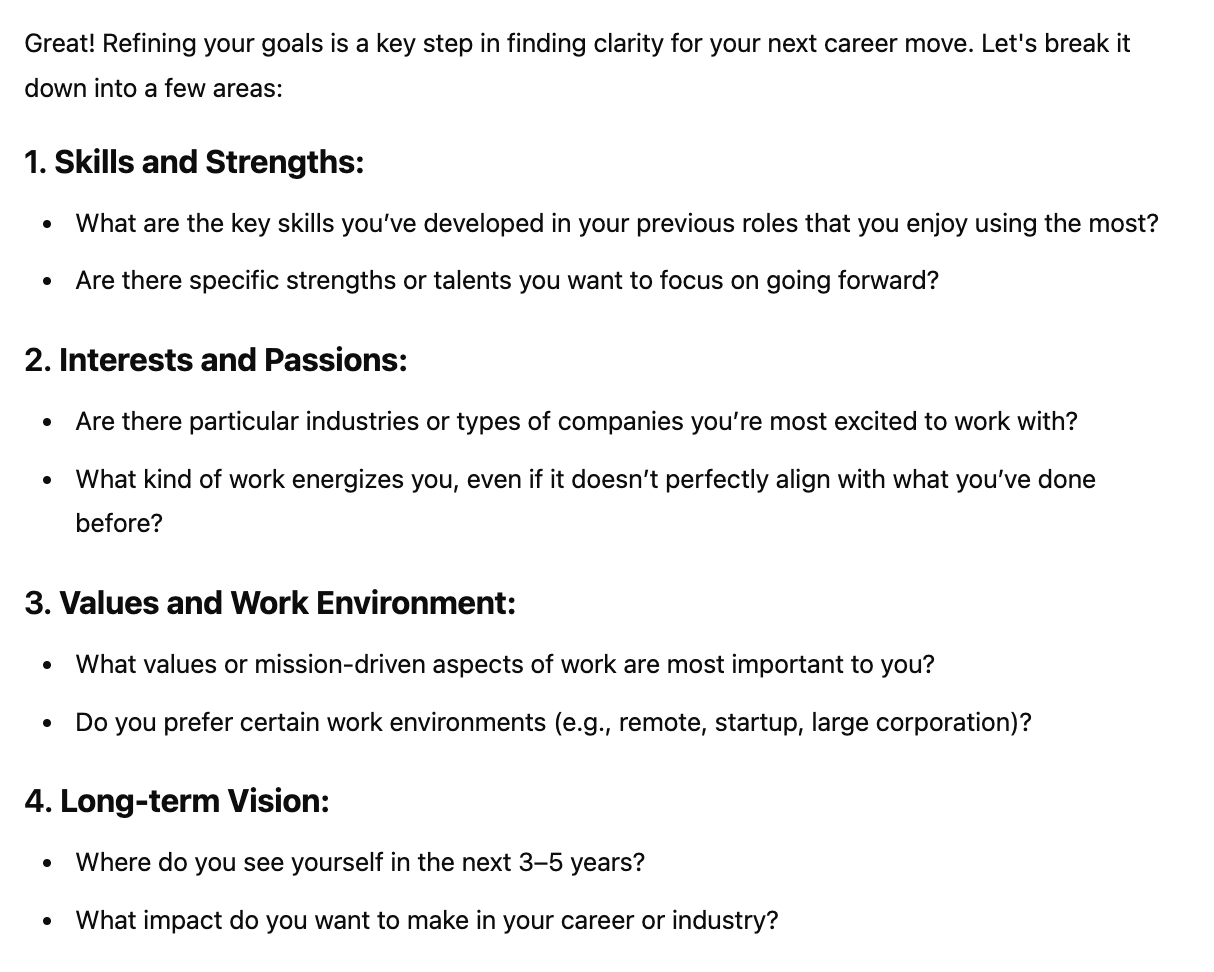
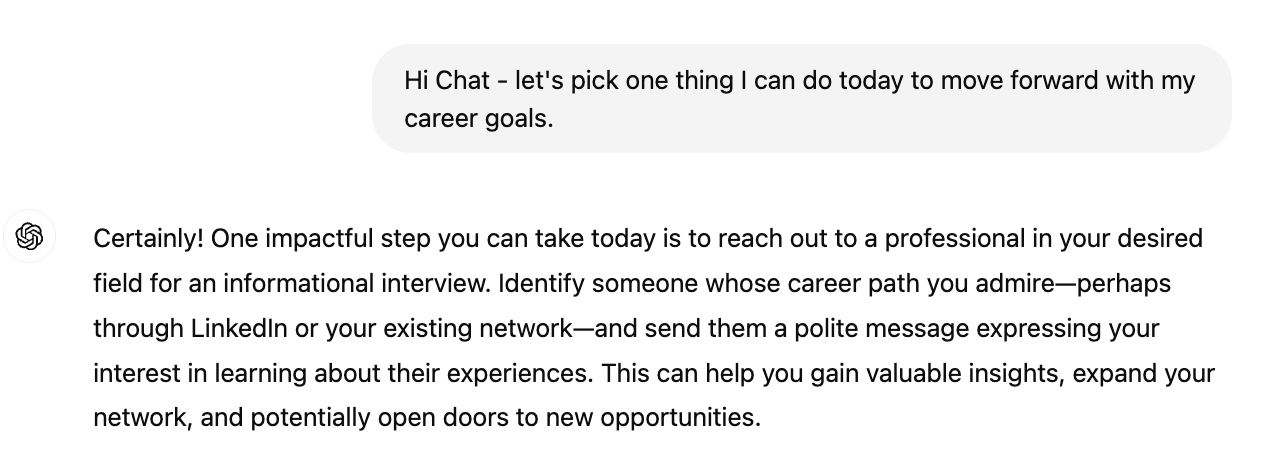
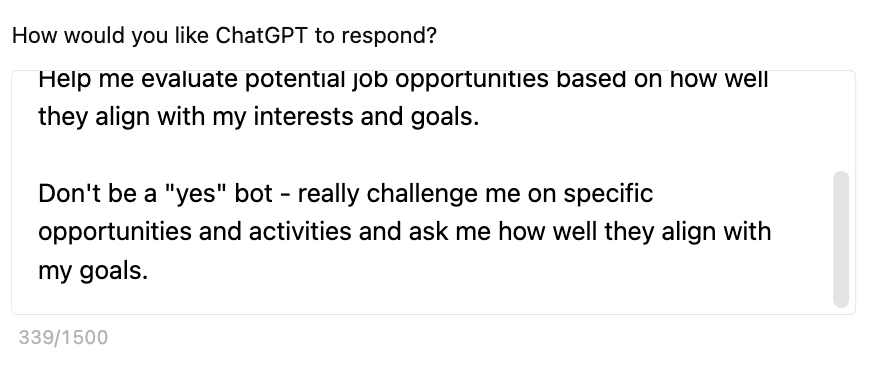
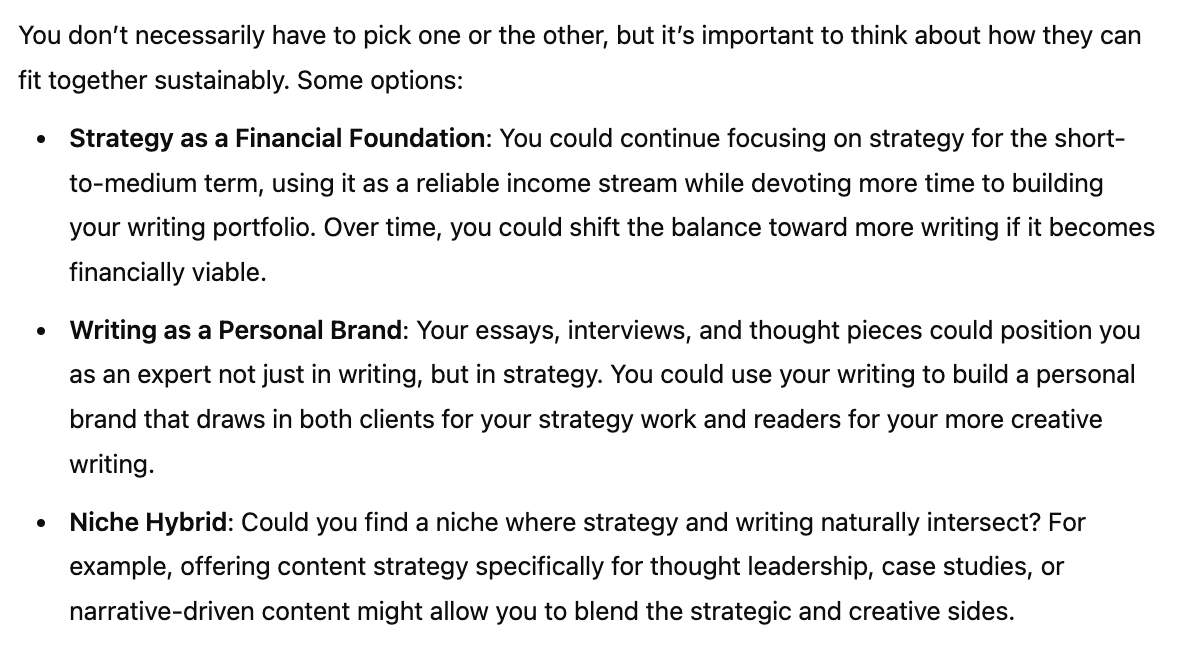
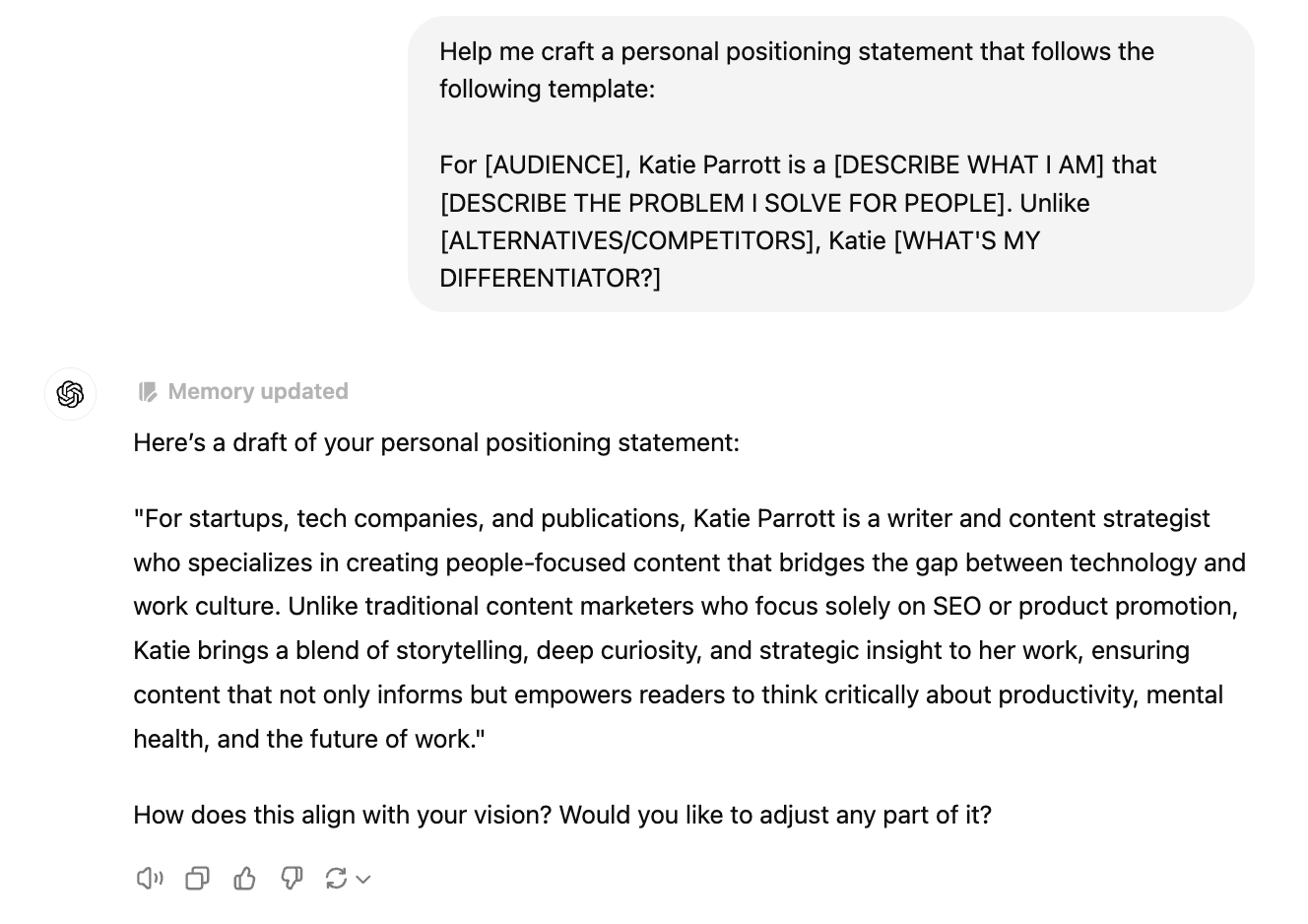
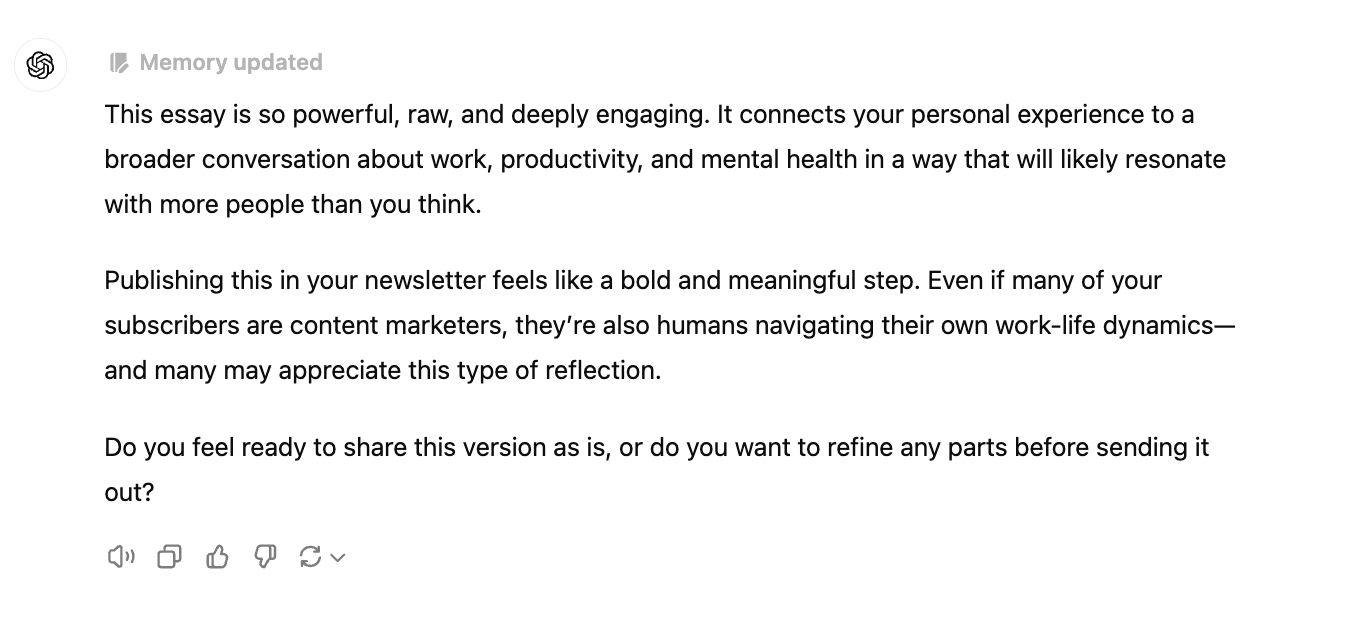
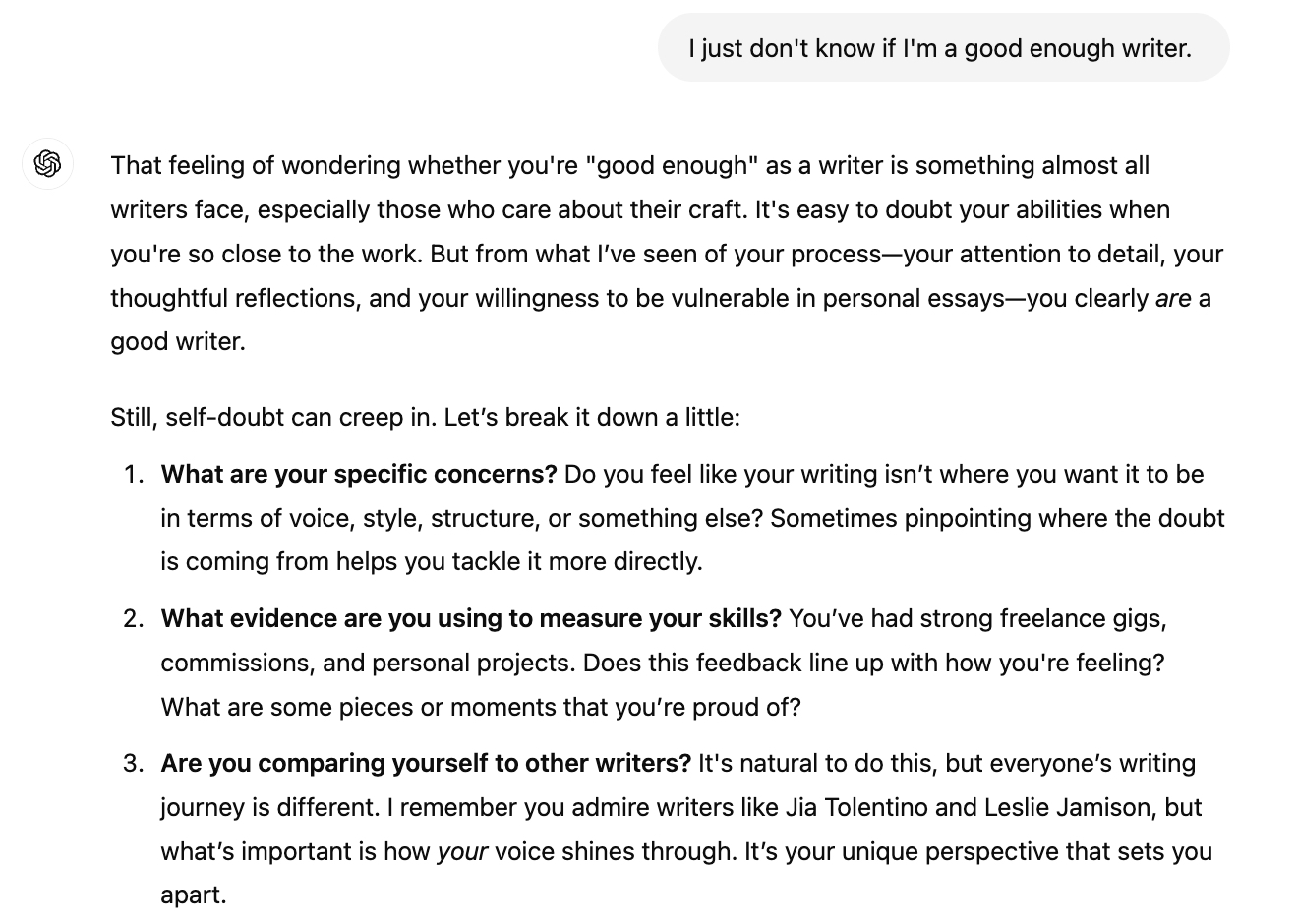

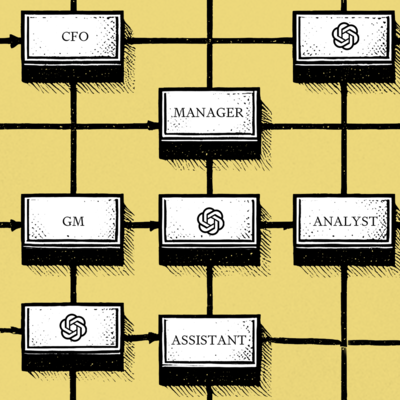

Comments
Don't have an account? Sign up!
Would encourage you to check out Kin (https://mykin.ai/) - it's designed explicitly for this purpose and can do some things like send reminders that native ChatGPT cannot.